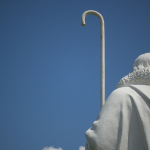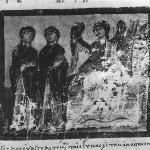I’m up to my elbows in Metropolitan John…
Zizioulas is working with the idea that sin is actually a rupture between being and communion, or what he calls the “individualization of our being.” The fall “results from the claim of created man to be the ultimate point of reference in existence (to be God).” p.102 He has already built his case that being is communion (I’ll not rehearse it here fully, but only in part), and is saying that what lies behind the fall is a refusal to make being dependent on communion. Other points of view would say that you first “are” and then you relate. He says that is an individualist ontology (individualization of our being) and is derived from the fall and a denial of the nature of our being: we find being only in communion.
Truth, then is a relational category, and is not bound up in the nature of substance of things. But in the West there is a subject/object structuring of truth. If it is bound up in the nature or subject of things, then we can only ever objectify something before we know it. All of this to record a quote or two:
“In associating the nature or substance of things and with the kind of understanding which is inherent in this individualism of existence, man restricts himself to reaching a relationship between communion and love only after obtaining a knowledge of the “object” of his love. The “other,” whether in the form of a “person” or a “thing,” is present as an object of knowledge before any relationship of communion can take place. Knowledge precedes love, and truth precedes communion. One can love only what one knows, since love comes out of knowledge, (except that this happens in our fallen condition, and ought not to be turned into an element of our metaphysical anthropology or, even less, of our approach to Trinitarian theology)…” p.104
“To be saved from the fall, therefore, means essentially that truth should be fully applied to existence, thereby making life something true, i.e. undying. For this reason the Fourth Gospel identifies eternal life, i.e. life without death, with truth and knowledge. But it can be accomplished only if the individualization of nature becomes transformed into communion – that is, if communion becomes identical with being. Truth, once again, must be communion if it is to be life…being a person is fundamentally different from being an individual or a “personality,” for a person cannot be imagined in himself but only within his relationships.” p.105
“We usually identify a person with the “self” (individual) and with all it possesses in its qualities and experiences (the personality). But modern philosophers recall with good reason that this is not what being a person means….the essential thing about a person lies precisely in his being a revelation of truth, not as “substance” or “nature” but as “mode of existence”…true knowledge is not a knowledge of the essence or the nature of things, but of how they are connected within the communion-event.” p.106
“The person is the horizon within which the truth of existence is revealed, not as simple nature subject to individualization and recombination but as unique image of the whole and the “catholicity” of a being.” p.106
“The mystery of being a person lies in the fact that here otherness and communion are not in contradiction but coincide. Truth as communion does not lead to the dissolving of the diversity of beings into one vast ocean of being, but to the affirmation of otherness in and through love. The difference between this truth and that of “nature in itself” lies in the following: while the later is subject to fragmentation, individualization, conceptualization, comprehension, etc., the person is not. So in the context of personhood, otherness is incompatible with division.” p.106-7
“This identification of otherness with unity is incompatible with fallen existence, into which we are born as individuals with a clear tendency to seize, dominate and possess being. This individualized and individualizing Adam in us is our original sin, and because of it the “other,” i.e. beings existing outside ourselves, in the end becomes our enemy and “our original sin” (Satre). A human being left to himself cannot be a person. “ p.107
I’m trying to pass some of what Franke and Roxburgh have said through Zizioulas. So far I think that it all works really well together. With an individualist ontology, approaching the “other’ can only be done in divisive ways. However, in Zizioulas’ structure, otherness is identified with unity.
















